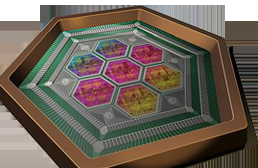(单词翻译:单击)

At the Collider exhibition in London’s Science Museum there is a mock-up of an office corridor at Cern, the huge Geneva laboratory where the Higgs boson was unmasked. A poster on a door, featuring the photograph of a cat, proclaims: “Lost cat”. Then, underneath: “Please return dead and alive to Erwin Schrödinger.”
伦敦科学博物馆(Science Museum)的对撞机展上有条走廊,是根据欧洲核子研究中心(Cern,位于日内瓦的一座大型实验室,曾发现希格斯玻色子)一条办公室走廊的原样复制过来的。走廊里有扇门上贴着一张海报,醒目地印了一只猫的照片,上书“寻猫启事”。这几个字下面写着:“请将这只既死又活的猫还给埃尔温•薛定谔(Erwin Schrödinger)。”
The cat – a feline in a locked box that is both dead and alive until the box is opened – was a thought experiment devised by physicist Schrödinger to expose the counterintuitive weirdness of quantum theory. The theory posits that an entity can exist simultaneously in any number of states until the point at which it is observed, whereupon it will “collapse” into one state – either purring or deceased in the case of the trapped tabby, which is incarcerated with a poison that either has or has not been released through radioactive decay.
“薛定谔猫”(一只关在箱子里的既死又活的猫,只有打开箱子才能知道它的死活)是物理学家薛定谔设计的一个思想实验,用来展示量子力学那有违直觉的怪诞。该理论假设,一个实体可同时处于多种状态,直到它被观测到的那一刻为止,因为那时它会“坍缩”成明确态——就那只被囚禁的花猫而言,就是要么它还在哪儿打呼噜,要么已成一具猫的尸体:关猫的箱子里放有一只毒气瓶,里面的毒气或者未被或者已被基于放射性衰变机制的触发器释放出来。
Geniuses have spotted that tapping into the quantum realm could release fantastic amounts of computing power. Where a classical bit must be either 0 or 1, a quantum bit, called a qubit, can be 0 or 1 – or, crucially, a mixture of both. Freed of this “either-or” constraint, even a modest quantum computer would vastly outpace the fastest supercomputer. Cracking the world’s toughest encryption software, which would take a supercomputer about 1m years, would be an hour’s work.
天才们已经发现,进军量子领域能释放出极其庞大的计算能力。一个二进制位(bit)上的数字非“0”即“1”;而一个量子位(qubit)上的数字可是“0”可是“1”——关键的来了,还可既是“0”又是“1”。摆脱了这种“非此即彼”的限制后,即便是一台一般般的量子计算机也能完爆最快的超级计算机。破解全世界最强的加密软件,超级计算机需要约100万年,量子计算机只需要一个小时。
Google and Nasa have jointly forked out a reported $10m on a prototype quantum computer from D-Wave Systems, the only commercial company selling them.
D-Wave系统公司(D-Wave Systems)是唯一一家销售量子计算机的商业公司——据报道,谷歌(Google)和美国国家航空航天局(Nasa)已联合出资1000万美元购买该公司生产的一台量子计算机原型机。
D-Wave’s financial backers include Amazon founder Jeff Bezos, Goldman Sachs and the Canadian government. The company can claim “coolness” in another way: since atoms need to be cooled right down in order for quantum effects to appear, D-Wave’s laboratory near Vancouver houses possibly the coldest place on Earth, just 0.02C above absolute zero (the point at which atoms stop moving).
D-Wave的金主包括亚马逊(Amazon)创始人杰夫•贝索斯(Jeff Bezos)、高盛(Goldman Sachs)以及加拿大政府。这是一家很“酷”的公司,这里的“酷”有着另一层含义:为了显现出量子效应,原子需要被大幅冷却,因此人们在D-Wave位于温哥华附近的实验室里可以找到大概是地球上最冷的地方,其温度仅比绝对零度(原子停止运动的温度)高0.02摄氏度。
Where tech visionaries tread, national governments follow. The UK will be spending £270m over the next five years to establish centres of excellence. As the world demands ever more powerful computers, and as conventional chips reach their physical limits, early investors hope Schrödinger’s cat can be turned into a cash cow.
科技先锋走向哪里,政府就跟向哪里。未来五年,英国将投资2.7亿英镑建立示范中心(centre of excellence)。既然世界需要更强大的计算机,而常规芯片又达物理极限,早期投资者们就寄望于薛定谔猫能变为摇钱树。
There is only one problem: there is a simmering debate over whether D-Wave’s quantum computers are actually quantum at all. Scott Aaronson, a quantum computing expert at Massachusetts Institute of Technology, says that while there is evidence for small-scale quantum effects, there is no definitive evidence that D-Wave has achieved a fully fledged quantum computer. Neither, Mr Aaronson says, is it faster than classical computers.
只有一个问题:围绕D-Wave的量子计算机是否真的实现了量子计算,即将爆发一场辩论。美国麻省理工学院(MIT)量子计算专家斯科特•阿伦森(Scott Aaronson)说,虽然有证据显示存在小规模量子效应,但没有确凿证据证明D-Wave已造出了完全成熟的量子计算机,而且D-Wave的计算机也不比常规计算机快。
Now IBM researchers have waded in. Two weeks ago scientists from the IBM Thomas J Watson Research Center in New York, abetted by colleagues at the University of California, Berkeley, posted a paper entitled: “How ‘Quantum’ is the D-Wave Machine?” By taking on the same fiendish computing challenge posed to the D-Wave, and showing they could churn out pretty similar results with a classical algorithm, they claimed it was impossible to say definitively whether the machine was truly quantum.
现在,IBM的研究人员也参与进来。近日,纽约IBM托马斯•J•沃森研究中心(Thomas J Watson Research Center)的科学家在美国加州大学伯克利分校(University of California, Berkeley)同僚的怂恿下,发布了一篇名为《D-Wave的机器到底有多‘量子’?》(How 'Quantum' is the D-Wave Machine?)的文章。通过挑战D-Wave挑战过的一个极其棘手的计算难题,并用经典算法生成出与D-Wave极为相似的结果,这些科学家主张,不可能明确认定D-Wave的机器到底属不属于量子计算机。
Geordie Rose, D-Wave’s pugilistic founder who is also a former Canadian wrestling champion, defended his machine and accused his detractors of cherry-picking data. On his Hack the Multiverse blog, he wrote: “When I saw how trivially wrong [the paper] was, it was like opening a Christmas present and getting socks.” Ouch.
作为前加拿大摔跤冠军,D-Wave创始人乔迪•罗斯(Geordie Rose)的好斗之风不改。他为自己的机器进行了辩护,并指责他的批评者挑选支持他们主张的数据。他在自己的“侵入多重宇宙”(Hack the Multiverse)博客上写道:“当我看到(那篇文章)错得多么没有价值时,感觉就像拆开圣诞礼物后看到里面是袜子。”哎哟,好辛辣!
For all the delicious backbiting and ego-baiting and megamoney gambles, quantum computing really does look like the natural next step in computational problem-solving, even if it can only crack a limited class of problems. In these early days of the revolution, we may have to take it on faith that the quantum computers around today are the real deal.
虽然这些背后中伤、瞄准别人自负心理展开的求关注行为以及一掷千金的豪赌让人看得津津有味,但量子计算看上去确实像是计算求解问题领域的必然发展方向,尽管它只能破解有限类别的问题。处于这场革命早期阶段的我们,或许不得不相信目前出现的量子计算机是名副其实的。
Still, there is a pleasing irony to the uncertainty. Central to quantum theory is Heisenberg’s uncertainty principle, which states that we can never measure every property of a particle to the utmost precision. The universe places fundamental limits on our ability to know: just as the fate of Schrödinger’s famous cat remains a mystery to anyone outside the box, so, perhaps, does the truth about today’s quantum computers.
不过,这种不确定性也带着一丝有意思的反讽意味。量子理论的核心是海森堡(Heisenberg)的不确定性原理(uncertainty principle),即我们永远无法极为精准地测量出一个粒子的每一项属性。宇宙对我们的求知能力设置了根本性的限制:正如薛定谔那只著名的猫的命运对箱子外的人来说仍是个谜题一样,与今日量子计算机有关的真相也有待时间来揭晓。


